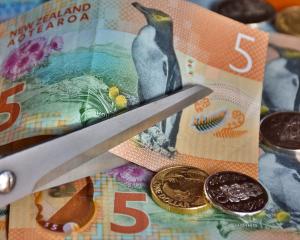Craigs Investment Partners broker Chris Timms said while the cash registers were ringing during the holiday sales, investors continued to punish the shares of Australian's hurting retailers.
Earnings downgrades by major retail companies JB Hi-Fi, Billabong International and Kathmandu Holdings in the approach to Christmas set the tone for negative sentiment and things had not improved.
In the first two days of trading, JB, Billabong and Kathmandu all fell more than the ASX 200 index. Myer was last down 1% and David Jones was 1.3% lower.
Harvey Norman was down 0.3%.
JB Hi-Fi was 1.3% lower and Kathmandu was down 1.5%. The ASX 200 Index was 0.9% lower at 4051.6.
Mr Timms put some of the falls down to a soft market but investors were nervous about any bad news. Harvey Norman was starting to improve late yesterday, along with David Jones.
Reuters reported that Greece's retailers had their worst Christmas in decades, with sales dropping by 30% compared with the corresponding period last year, as the economic crisis shattered consumer confidence.
"Nine out of 10 Greeks are less generous, not out of choice but out of necessity," ESEE said.
"Retailers endured a Christmas gloom that chipped away any optimism they had before the holidays."
The sharp drop in sales came despite widespread discounts by retailers in the period preceding Christmas.
Greeks had been suffering wage and pension cuts, rising inflation and a recession into its fourth year, which had slashed living standards and forced them to rein in spending.
Retailers in London's prestigious West End shopping district reported brisk trading and added that a Tube strike had not made much of a dent in their business.
"I think the impact has been really minimal. It hasn't deterred shoppers," said Jace Tyrell, from the New West End Company, which represents firms operating in the area.
New West End said the Boxing Day sales in London had been buoyed by the presence of wealthy international tourists from China, Saudi Arabia and Brazil.
In the United States, shoppers found a mixed bag of bargains and so-so deals on what was likely to be the third-busiest shopping day of the holiday season on Monday (US time).
Chains were also hoping that shoppers coming in to redeem the millions of gift cards given as presents might be willing to spend extra cash of their own.
Many retailers were still relying on bargains to entice shoppers on the day after Christmas.
In 2010, chains rang up about $US62 billion ($NZ80 billion) in sales during the final week of the year, about 12% of the total for the holiday season, despite snowstorms.
"This year we'll blow through that, with about $US72 billion in sales for this retail 'second season'," Craig Johnson, president of Customer Growth Partners, told Reuters.
Retailers could sell as much as $US29 billion worth of merchandise on Monday alone, eclipsing the $27 billion in sales on Black Friday, Mr Johnson said.
Internet offers were popular, especially on Christmas, when most stores were closed. Target Corp, for example, offered $US10 off online orders of $50 or more. Online sales on Christmas Day rose 16.4% from 2010.
The US National Retail Federation expects holiday season sales to rise 3.8% to a record $US469.1 billion, slower than last year's growth but stronger than its pre-season forecast.
The potential shopping boom comes as a weak labour market that has dragged on the economy shows signs of turning. The number of Americans filing new claims for jobless benefits hit a three-and-a-half-year low in the week before Christmas, and consumer sentiment scaled a six-month high in December, with more Americans optimistic.
US consumer spending, which accounts for about two-thirds of US economic activity, rose less than expected in November.
Sears Holdings said it would close 100 to 120 Sears and Kmart stores after disappointing holiday sales. Its stock, having already lost 37% of its value this year, tumbled 20% to $US36.61 on the news, the biggest percentage fall in the S&P 500.
One of its key suppliers, Whirlpool Corp, was down 5.6%.
The final list of stores to be closed had not yet been determined, Sears said in a statement.
In a change of strategy, the company said it no longer planned to keep "marginally performing" stores open. Sears, with more than 4000 full-line and specialty retail stores in the US and Canada, planned to take as much as $US2.4 billion of charges in the fourth quarter on asset write-downs and other items.












